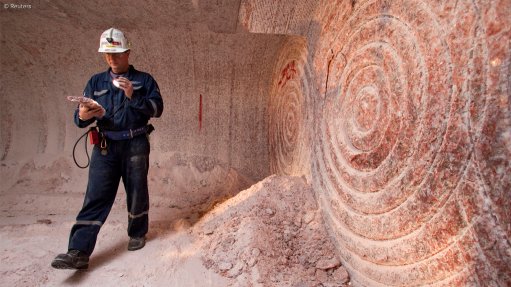
Photo by: Reuters
VANCOUVER (miningweekly.com) – Fertiliser giant Nutrien on Monday reported full-year and fourth-quarter results for its constituent entities Agrium and Potash Corporation of Saskatchewan, saying both firms had benefitted from improving potash pricing as growers continue to focus on increasing productivity by using crop inputs and solutions.
The results were the first since the completion of the merger between Agrium and Potash Corporation to form Nutrien in January this year.
In the year-to-date, the merged entity has recorded at least $40-million in run-rate synergies, the company said in a statement. For the full year, Nutrien expects to realise cash synergies of $175-million to $225-million and run-rate synergies of $250-million.
Agrium reported fourth-quarter earnings from continuing operations of $27-million, down from the $69-million earned in the fourth quarter of 2016. Full-year earnings were $502-million, compared with $584-million in 2016.
Nutrien advised that Agrium's results for the quarter and full year were supported by record retail business unit performance and higher potash sales volumes and margins, but were more than offset by lower nitrogen sales volumes and margins related to plant outages in the second half of 2017.
PotashCorp reported a net loss of $76-million for the fourth quarter, however, this included noncash impairment charges in phosphate of $276-million and net tax recovery adjustments of $118-million. Adjusted earnings were $59-million for the quarter and $455-million for the year, supported by higher potash prices and lower costs.
Nutrien said global potash shipments set a new record of about 64-million tonnes in 2017, with significant growth achieved in all major markets. Downstream inventories ended 2017 at levels flat to lower than a year ago, meaning global shipments increased in response to rising consumption.
The company expects demand will continue to be robust this year and that yearly global potash shipments will be between 64-million and 66-million tonnes.
According to Nutrien, the North American spring application rates are expected to remain normal, supported by good affordability, and it anticipates shipments similar to the historical average but slightly below 2017. Brazilian potash imports set a new record of 9.2-million tonnes in 2017, and inland inventories ended the year at historically low levels, indicating robust consumption supportive of strong import demand in 2018.
Chinese and Indian potash demand was strong in 2017 and inventories ended the year flat to lower than 2016 levels. Nutrien guides for continued demand growth in China and India in 2018, but at a slower pace than 2017 levels. Potash demand remains reasonably strong in other Asian countries amid stable and profitable prices for a range of key crops.
Nutrien said most global potash producers have heavily committed sales volumes for the first quarter of 2018, leaving available supplies relatively tight. Greenfield potash capacity is anticipated to continue to ramp up in 2018, but it expects a portion of the new capacity will be offset by the closure of mines reaching end-of-life and product mix changes by some producers.
Meanwhile, nitrogen prices have started 2018 firmer, with current benchmark nitrogen prices up by 15% to 40% from fourth-quarter 2017 lows, depending on the product.
Global energy prices are expected to increase marginal production costs this year, as crude oil prices have increased about 20% year-on-year, supporting both formula-based gas contracts in Europe and liquefied natural gas prices. Chinese production rates have been cut back by ongoing regulatory pressure, natural gas availability, significantly higher natural gas prices and continued strength in coal prices.
However, higher input costs have lent support to phosphate prices, but continue to weigh on margins. Sulphur prices have recently risen and remain about 50% above 2017 lows, while traded ammonia prices are up 50% to 70% from 2017 lows. Nutrien said production curtailments have reduced export availability from both the US and China, which has provided some support to phosphate fertiliser prices.
Nutrien has guided for full-year 2018 profit of $2.10 to $2.60 a share from continuing operations, excluding added depreciation and amortisation related to purchase price allocation of $150-million to $300-million. Nutrien expects its earnings before interest, taxes, depreciation and amortisation (Ebitda) to be between $3.2-billion to $3.7-billion for this year.
It added that expected costs would achieve ongoing synergies of $50-million to $70-million in 2018, which are excluded from its earnings per share and Ebitda guidance.
Nutrien's NYSE-listed equity closed the day 3.38% lower, amid an historic equity selloff in the US. The stock fell a further 1.64% in after-market trading to $47.50 apiece.